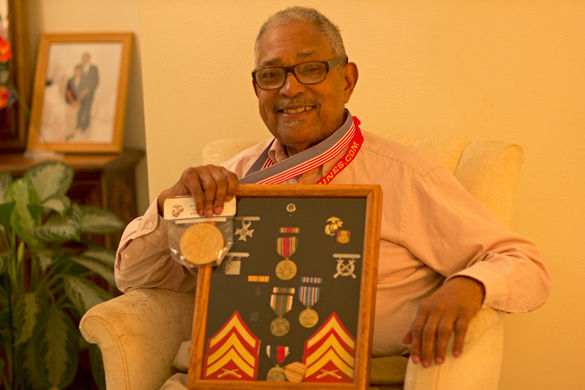Iwo Jima veteran displays true patriotism

November 7, 2013
As an African American surviving through the Great Depression, the Battle of Iwo Jima and segregation, Archibald Mosley has always carried two values with him: grit and divine spirituality.
In 2011 Mosley was honored in Washington for his service in World War II as a member of the Montford Point Marines, the first black men allowed to serve in the Marine Corps. However, he never accepted the award for his individual successes, but the victories of all 20,000 soldiers that served at Montford Point.
“My feeling was never that I was receiving the honor,” Mosley said. “I was receiving it for all of my buddies.”
Advertisement
Mosley has survived perhaps the most significant stretch of time in American history—from decades of deep-rooted segregation to the election of an African-American president. Despite the odds, Mosley has used strong will to guide him through the struggles.
A Carbondale native, Mosley was born May 25, 1925 on East Oak Street.
Segregation played a role early in his life. He used to pay a dime to see old Buck Jones and Tom Mix westerns at the Roger’s Theater, although his black friends and he would have to sit in the back of the theater. Ironically, he used to play games of cowboy by the railroad tracks with his white friends who had the privilege of sitting closer to the screen, despite paying the same dime to enter.
Mosley went to an all black school at Attucks, close to his home.
“Our school was named after Crispus Attucks, the first man to shed blood for the independence of this country and he was a black man,” he said. “The whites went to another school and no blacks went to that school.”
He was enrolled in his first semester at Southern Illinois University when he received his draft letter in 1942, the same year he proposed to his girlfriend, Jeroline Thomas.
After joining the Marines, Mosley rode a train on a Jim Crowe car to a segregated military base in Jacksonville, N.C.
Advertisement*
Mosley described the black base at Montford Point as mud huts reminiscent to the woodshed where his father would punish him. The white soldiers stayed in the brick barracks; black soldiers could not enter the base unless guided by a white officer.
Despite facing the unfair conditions, Mosley trained vigorously for three years at Montford Point earning him the rank of squad leader of a nine-member group.
In 1944, the U.S. wanted to attack Tokyo — which required occupying Iwo Jima, Mt. Suribachi — so that American planes could refuel.
“This country, if they wanted to win the war, they would have had to drive them back to Japan,” Mosley said. “On a volcanic island with ash, attacks were no good.”
Mosley said in order to seize the four-mile-long island, the U.S. needed an amphibious force; one that could move fast on land, sea and air.
The members of the Fifth Amphibious Corps approached the formidable volcanic island in June. The troops had the daunting task of seizing the airways against a relentless group of Japanese soldiers.
Clouds of smoke from explosions obscured the island from their view as they approached by boat. They pushed on and bombarded the island with their own weaponry. The soldiers fought their way ashore for three days until they had enough ground to dig foxholes, a task that was very difficult to do because of the constant raining down of volcanic ash that refilled the trenches.
The Montford Point Marines played a significant role in seizing Iwo Jima. Some were on the front lines fighting; Others handled communications efforts. They helped build roads and facilities and other Montford Point Marines salvaged supplies from damaged planes and ships when parts were scattered across the beach.
While his squad was sleeping in the foxholes, and American victory appeared imminent, the Japanese staged a desperate last effort attack called a banzai charge. The enemies had them surrounded.
One of the Japanese soldiers threw a grenade into a dump of white phosphorus, causing the dangerous burning agent to fall down like snow into Mosley’s foxhole. Everyone covered their bodies with ponchos while the white phosphorus fell; except for a Marine they called Baby Face.
Baby Face did not wake up from the blast. His entire body was covered with the deadly substance; Within seconds, he was rolling around screaming from the agony of his skin being burned as the white phosphorus stuck to his skin.
The squad faced the tough decision of what to do knowing that Baby Face could not be saved. They could either shoot him or watch him die.
Mosley kneeled over Baby Face and began to pray.
“Our Father, which art in heaven,” he said. Suddenly, Baby Face stopped screaming and moving. He died before Mosley could finish the prayer; everyone remained silent.
Being able to put his fallen Marine at peace is a moment that Mosley said he would never forget. In total, six out of the nine Marines returned from the war.
Mosley was there to see the iconic raising of the American flag by the six soldiers — which signified the near end of the conflict on the island — though the battle raged on for a short time after.
While the white Marines were honored in Washington, the Montford Marines’ effort was greatly disregarded as the soldiers’ successes remained in the shadows.
After the war, Mosley enjoyed an esteemed career as a clergyman for the Methodist church.
He graduated from SIU with a bachelor’s degree in speech communication, and left the region to attend a seminary school in Ohio where he got his master’s in theology and a Ph.D. in communications. He spent a brief time raising his family and ministering in Colp.
Mosley was summoned to Lansing, Mich., where a member of a financially struggling church promised to make him a bishop if he could save it.
“He said, ‘young man, if you go up here and save this property for the church, I’ll see that you become a bishop in the church.’ And I went up there and I saved it. I got up there and I needed $20,000 in 90 days.”
Mosley is still baffled by how he was able to raise the funds, but he praises God for the miracle.
“That’s why I tell people you don’t need to think that God isn’t still in the miracle-forming business, because that’s a miracle and I don’t know how it happened. I really don’t,” he said.
Mosley spent six years in Lansing until he was summoned to be a reverend at a church in Detroit. During the riots of 1967, he recalled grabbing people off the streets near 12th St. and bringing them to the basement of the parsonage for prayer.
Mosley retired from the church because of the energy strain and spent three years as the dean at Shaw College of Detroit. He retired from the college because the emotions got the best of him.
“I got tired of my old job as dean, because kids get in your heart and you get in their heart, too,” he said. “When you love people, you love people.”
Mosley’s love for people and his invested spirituality have propelled him through the toughest of times, even at Iwo Jima.
Mosley said the Montford Marines honor in Washington was a pivotal moment in his treasured life — although he will never forget the adversities faced from the past.
Mosley lives with his wife in Carbondale and has four daughters. He remains to be an active member in his church despite being retired from preaching.
“I know God is my God because of things I have seen him do,” he said. “The things I’ve seen God do and I don’t know how he did them.”
Advertisement








